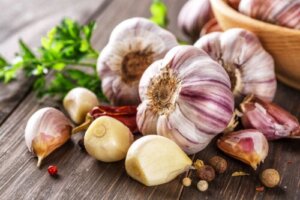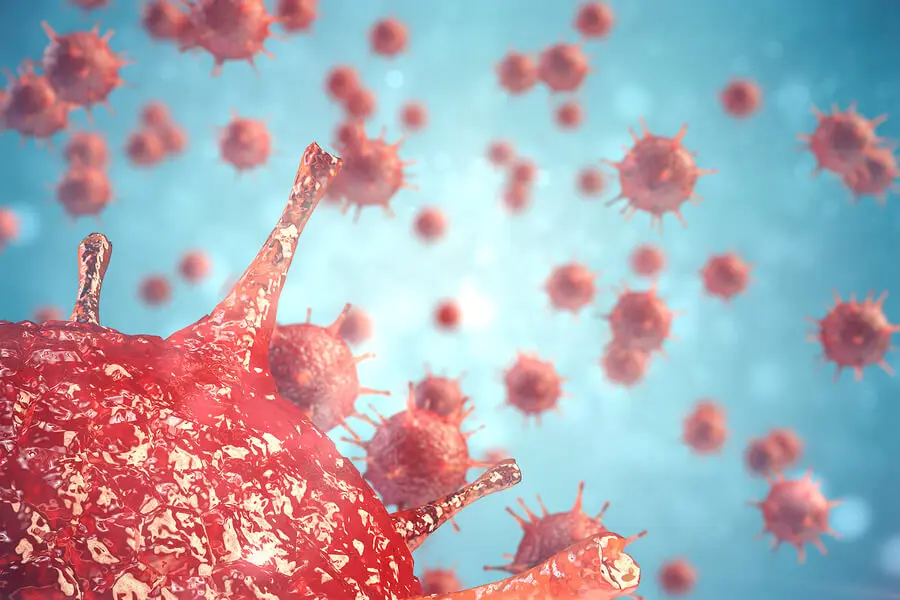Myths About Garlic Consumption and The Facts


Reviewed and approved by the doctor Leonardo Biolatto
There are several myths about garlic consumption that have generated confusion about its properties. While it is true that garlic is a nutritious and healthy food, some of the “almost miraculous” effects attributed to it aren’t really true.
Like other foods, this bulb can contribute to health care when included in a healthy and balanced diet. And although its pharmacological potential has been extensively studied, certain effects are nothing more than false beliefs.
Interested in learning more about it? We’ll tell you all about it in detail here.
The four main myths about garlic consumption and the facts
Garlic (Allium sativum L.) is a spice widely used in Mediterranean cuisine and in other parts of the world. It’s often used to season meats, fish, soups, and rice dishes, among many other recipes. It’s also an ingredient that’s highly valued for its medicinal properties.
As compiled in a review in the Avicenna Journal of Phytomedicine, its main active compound, allicin, confers antibiotic, anti-inflammatory, antihypertensive, hypoglycemic, antiproliferative, and antiviral effects.
Thus, on its own or as a complementary therapy, its intake helps in the prevention and treatment of various health disorders. The problem? Many of its effects are not as magical as some people think. In fact, several of its applications have even been labeled as myths. Let’s take a look at them.
We think you may be interested in reading this, too: How To Reduce Cholesterol with Garlic: 3 Home Remedies
1. Eating garlic on an empty stomach can promote weight loss
One of the most widespread myths about garlic consumption is that consuming it on an empty stomach can help you lose weight. It’s claimed that chewing a clove of garlic first thing in the morning – alone or combined with a spoonful of olive oil or honey – activates the metabolism and promotes fat burning.
However, these claims have been refuted by doctors, nutritionists, and scientists alike. First of all, there is no evidence that eating garlic on an empty stomach has a better effect than eating it at other time of the day.
On the other hand, there’s no food or compound that by itself can generate significant weight loss. The process of losing weight requires a multidisciplinary approach, in which nutritionists, doctors, physical trainers, and even psychologists must be involved.
There are multiple factors that affect weight gain and obesity, so it’s necessary to address them in a comprehensive manner to achieve a healthy and stable weight in the long term. In addition to this, it’s also necessary to consider the individual characteristics of each person to obtain a personalized plan.
What the science says about garlic and weight loss
It’s clear that garlic alone does not help to lose weight. However, including it as part of a balanced, calorie-controlled diet can be beneficial.
A meta-analysis reported in the International Journal for Vitamin and Nutrition Research found that garlic supplements do not have a significant effect on body weight or body mass index (BMI). Despite this, they do appear to help reduce waist circumference in obese patients.
In fact, a study shared in Advanced Biomedical Research reported that garlic supplementation promotes the reduction of body weight and fat mass in people with non-alcoholic fatty liver disease.
Other animal studies have yielded similar results. However, in these cases, products such as garlic oil and garlic extract have been used instead of raw garlic.
Having said all this, the truth is that garlic can complement a healthy diet when it comes to weight loss, but it does not make you lose weight on its own or in mixtures.

2. Garlic can be used to detoxify the blood
There are those who consume raw garlic with the idea of “purifying” or “detoxifying” the blood. The argument is that the sulfur compounds in this food can promote the elimination of toxins from the blood by stimulating liver function.
But is this really true? Unfortunately, this is another one of the many myths about garlic.
There’s no scientific evidence that raw garlic, aged garlic, or any supplement of this food cleanses the blood. On the contrary, medical and nutritional experts warn that anything that claims to “detoxify” is likely to do no good.
The reason is very simple: both the liver and kidneys are responsible for filtering the blood and breaking down waste substances. Thus, as long as these organs are healthy, it’s not necessary to consume external aids for the process to be completed optimally.
Of course, garlic is one of many foods that provide essential nutrients for the proper functioning of these organs. However, just as in the previous case, garlic alone is not a purifier.
The most efficient ways to keep the body free of toxins is through the adoption of a healthy diet, an exercise routine, and a lifestyle that’s free of habits such as alcohol and smoking. Eliminating the consumption of ultra-processed foods and drinking plenty of water are also helpful.
3. Garlic can be used to treat COVID-19
One of the most widespread myths during the COVID-19 pandemic was that garlic consumption could “cure” the disease. According to its proponents, it would be enough to chop 8 cloves of raw garlic and introduce them into 3 liters of boiling water. Once an infusion was obtained, it could “magically” alleviate the symptoms.
Of course, this is far from reality. Despite being a food with antimicrobial and antiviral potential, garlic alone can’t eliminate the coronavirus or its clinical manifestations. And although it’s a harmless remedy for most people, it’s unlikely to work to cure anything.
Studies on garlic and its potential against COVID-19
For now, health professionals agree that garlic is not a treatment for COVID-19. In spite of this, there are some scientific publications that speak of its possible benefits against this disease.
In fact, inNutrition Journal, scientists state that the organosulfur compounds and flavonoids in garlic have immunomodulatory effects that may be useful as an adjuvant therapy against the infection. In particular, it could contribute to reducing the side effects of drugs, since it makes it possible to reduce the dose used. However, larger and more conclusive studies are required.
However, the potential risks should not be overlooked. In a case report shared in Special Care in Dentistry, a patient suffered burns on her oral mucosa due to the daily intake of raw garlic as a measure to strengthen her immune system during the pandemic.
The same publication warns that this type of remedy can lead to abdominal and skin burns when used inappropriately.
The nutrients contained in garlic are beneficial to our health when included within the framework of a complete and balanced diet. Its raw consumption should be done in moderation.

4. Garlic has anti-cancer properties
Undoubtedly, this is one of the myths about garlic consumption that everyone should stop believing. Eating garlic raw, cooked, or in supplements cannot prevent or much less cure cancer. This idea comes from several preliminary and observational studies that speak of the anti-tumor potential of this spice.
In particular, it has been found to act against forms of cancer such as prostate, colorectal, breast, and endometrial cancer, among others. Even so, there is not enough evidence to consider it as a cancer treatment.
In addition, a statement from Pompeu Fabra University (UPF) states that the available evidence is not of sufficient quality to confirm garlic’s anticarcinogenic properties. It points out that more rigorous studies are required to determine its role against this disease more precisely.
Including garlic in your regular diet is healthy and provides the body with antioxidants, vitamins, minerals, and other key nutrients to take care of health. Its intake can complement a healthy diet and other healthy habits that are linked to the prevention of this type of disease.
Like this article? You may also like to read: Three Ways to Use Crushed Garlic to Treat Ingrown Toenails
Garlic: A healthy food, but not a miracle food
In short, including garlic in your regular diet can provide several health benefits. However, contrary to what many people think, by itself, it’s not miraculous nor is it a treatment option for diseases or excess weight.
In fact, it’s advisable to be cautious with its daily intake, especially raw, as it can cause nausea, burning in the mouth, and irritation in the stomach. It’s best to consume it in moderation and added to meals.
If you choose to choose its presentation in supplements, you must follow the manufacturer’s consumption recommendations. Above all, it’s essential to keep in mind that it can not replace any medical treatment.
All cited sources were thoroughly reviewed by our team to ensure their quality, reliability, currency, and validity. The bibliography of this article was considered reliable and of academic or scientific accuracy.
- Ansary J, Forbes-Hernández TY, Gil E, Cianciosi D, Zhang J, Elexpuru-Zabaleta M, Simal-Gandara J, Giampieri F, Battino M. Potential Health Benefit of Garlic Based on Human Intervention Studies: A Brief Overview. Antioxidants (Basel). 2020 Jul 15;9(7):619. doi: 10.3390/antiox9070619. PMID: 32679751; PMCID: PMC7402177.
- Bayan L, Koulivand PH, Gorji A. Garlic: a review of potential therapeutic effects. Avicenna J Phytomed. 2014 Jan;4(1):1-14. PMID: 25050296; PMCID: PMC4103721.
- Montesi L, El Ghoch M, Brodosi L, Calugi S, Marchesini G, Dalle Grave R. Long-term weight loss maintenance for obesity: a multidisciplinary approach. Diabetes Metab Syndr Obes. 2016 Feb 26;9:37-46. doi: 10.2147/DMSO.S89836. PMID: 27013897; PMCID: PMC4777230.
- Mofrad MD, Rahmani J, Varkaneh HK, Teymouri A, Mousavi SM. The effects of garlic supplementation on weight loss: A systematic review and meta-analysis of randomized controlled trials. Int J Vitam Nutr Res. 2021 Jun;91(3-4):370-382. doi: 10.1024/0300-9831/a000607. Epub 2019 Jul 30. PMID: 31357923.
- Soleimani D, Paknahad Z, Askari G, Iraj B, Feizi A. Effect of garlic powder consumption on body composition in patients with nonalcoholic fatty liver disease: A randomized, double-blind, placebo-controlled trial. Adv Biomed Res. 2016 Jan 27;5:2. doi: 10.4103/2277-9175.174962. PMID: 26955623; PMCID: PMC4763563.
- Kagawa Y, Ozaki-Masuzawa Y, Hosono T, Seki T. Garlic oil suppresses high-fat diet induced obesity in rats through the upregulation of UCP-1 and the enhancement of energy expenditure. Exp Ther Med. 2020 Feb;19(2):1536-1540. doi: 10.3892/etm.2019.8386. Epub 2019 Dec 27. PMID: 32010335; PMCID: PMC6966189.
- Lee MS, Kim IH, Kim CT, Kim Y. Reduction of body weight by dietary garlic is associated with an increase in uncoupling protein mRNA expression and activation of AMP-activated protein kinase in diet-induced obese mice. J Nutr. 2011 Nov;141(11):1947-53. doi: 10.3945/jn.111.146050. Epub 2011 Sep 14. PMID: 21918057.
- Kim MJ, Kim HK. Effect of garlic on high fat induced obesity. Acta Biol Hung. 2011 Sep;62(3):244-54. doi: 10.1556/ABiol.62.2011.3.4. PMID: 21840827.
- InformedHealth.org [Internet]. Cologne, Germany: Institute for Quality and Efficiency in Health Care (IQWiG); 2006-. What does blood do? [Updated 2019 Aug 29]. Available from: https://www.ncbi.nlm.nih.gov/books/NBK279392/
- Li G, Ma X, Deng L, Zhao X, Wei Y, Gao Z, Jia J, Xu J, Sun C. Fresh Garlic Extract Enhances the Antimicrobial Activities of Antibiotics on Resistant Strains in Vitro. Jundishapur J Microbiol. 2015 May 31;8(5):e14814. doi: 10.5812/jjm.14814. PMID: 26060559; PMCID: PMC4458355.
- Rouf R, Uddin SJ, Sarker DK, Islam MT, Ali ES, Shilpi JA, Nahar L, Tiralongo E, Sarker SD. Antiviral potential of garlic (Allium sativum) and its organosulfur compounds: A systematic update of pre-clinical and clinical data. Trends Food Sci Technol. 2020 Oct;104:219-234. doi: 10.1016/j.tifs.2020.08.006. Epub 2020 Aug 19. PMID: 32836826; PMCID: PMC7434784.
- Khubber, S., Hashemifesharaki, R., Mohammadi, M. et al. Garlic (Allium sativum L.): a potential unique therapeutic food rich in organosulfur and flavonoid compounds to fight with COVID-19. Nutr J 19, 124 (2020). https://doi.org/10.1186/s12937-020-00643-8
- Petrovic V, Nepal A, Olaisen C, Bachke S, Hira J, Søgaard CK, Røst LM, Misund K, Andreassen T, Melø TM, Bartsova Z, Bruheim P, Otterlei M. Anti-Cancer Potential of Homemade Fresh Garlic Extract Is Related to Increased Endoplasmic Reticulum Stress. Nutrients. 2018 Apr 5;10(4):450. doi: 10.3390/nu10040450. PMID: 29621132; PMCID: PMC5946235.
- Lee J, Zhao N, Fu Z, Choi J, Lee HJ, Chung M. Effects of garlic intake on cancer: a systematic review of randomized clinical trials and cohort studies. Nutr Res Pract. 2021 Dec;15(6):773-788. doi: 10.4162/nrp.2021.15.6.773. Epub 2021 Jul 26. PMID: 34858554; PMCID: PMC8601942.
- La ciencia no respalda el consumo de ajo para reducir el riesgo de cáncer. (2018). Universitat Pompeu Fabra, Barcelona. https://www.upf.edu/es/web/comunicacio/noticies/-/asset_publisher/Z43gkEdp7zFm/content/id/220466701/maximized#.Y36ZBXbMI2x
This text is provided for informational purposes only and does not replace consultation with a professional. If in doubt, consult your specialist.








